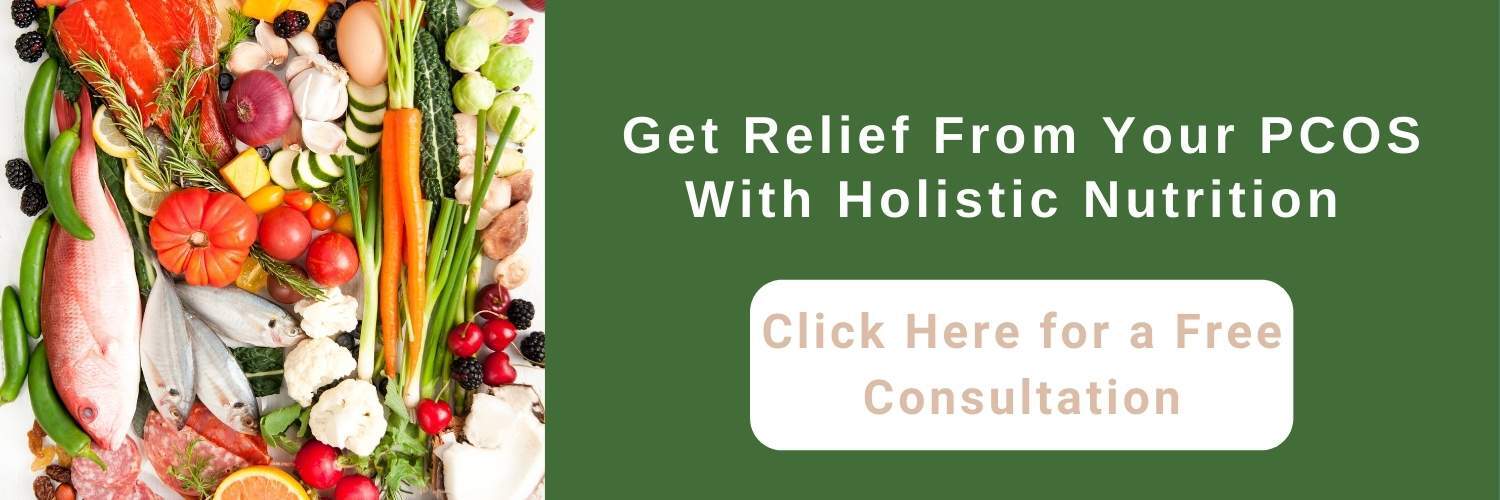Low-Carb Diets for PCOS: Are They Beneficial?
"The content below is not intended to be a substitute for professional medical advice, diagnosis, or treatment. Always seek the advice of your physician or other qualified health provider with any questions you may have regarding a medical condition."
You’re on the search for any way to overcome your PCOS, and you want to do it as naturally as possible.
Have you heard story after story of successes and failures, but you’re curious if your eating habits make a difference in how you feel? Are low-carb diets for PCOS a possibility?
If this sounds like you, you’ve come to the right place.
In this guide, we’re discussing whether or not low-carb diets for PCOS may be a treatment plan for you, lifestyle changes that decrease PCOS symptoms, and more.
Table of Contents
Does Diet Affect PCOS Symptoms?
Polycystic ovary syndrome (PCOS) affects one out of every ten women of childbearing age. Women dealing with PCOS experience hormonal imbalances and metabolism problems, affecting their fertility, health, and appearance.
Many of these women may not be informed of ways to reduce their symptoms naturally.
Although diet and nutrition may not be a “fix-all” for your PCOS symptoms, it can absolutely play a role in managing your symptoms.
By adjusting and managing your diet, you can not only reduce your risk for other medical concerns, but it can help you reduce the symptoms you may be experiencing.
How does your diet affect PCOS symptoms?
The nutrients you consume impact your hormone production — eating certain nutrients may cause or alleviate symptoms on a hormonal level. This is why it’s so important to consider every aspect of your diet and understand how specific foods and nutrients affect your body.
Many PCOS sufferers are insulin-resistant and unable to use insulin effectively because their cells cannot absorb glucose.
What Foods Should I Avoid if I Have PCOS?
Generally speaking, if you are someone suffering from PCOS, or any hormonal imbalance, it is widely suggested that you avoid foods such as:
- Fried foods
- Sugary beverages and sugary snacks
- Excess red meats
- Processed meats
- Refined carbohydrates
- Solid fats
- Inflammatory foods
Is a Low-Carb Diet Good for PCOS?
Recent studies have found that a low-carb diet can be beneficial to managing PCOS symptoms.
But does a low-carb diet mean a no-carb diet?
No. Foods with lower glycemic index levels, including ...
- Whole grains
- Legumes
- Nuts
- Starchy vegetables
- Fruits,
… that are unprocessed and low in carbohydrates may be the most beneficial for those diagnosed with PCOS.
Why Should You Consider a Low-Carb Diet for PCOS?
Foods that are high in refined carbohydrates can cause insulin levels in your body to rise more quickly — high insulin levels may cause the ovaries to make more androgen hormones such as testosterone.
Insulin also reduces the liver’s ability to produce the sex-hormone binding globulin (SHBG), which significantly influences the amount of “free” testosterone in a woman’s bloodstream. Think of SHBG as a shuttle that testosterone takes when tissues need it.
When the liver is unable to produce SHBG, more testosterone will enter a woman’s bloodstream, allowing it to target tissues it normally wouldn’t target.
This results in symptoms of PCOS like:
- Acne
- Lowered voice; and
- Facial hair.
Those suffering from PCOS may benefit from a low-carb diet by reducing:
- The insulin produced in the body
- Insulin resistance, and
- The amount of testosterone produced by the ovaries and more SHBG produced by the liver.
How Many Carbs Should I Eat With PCOS?
Diet isn’t a one size fits all solution. And what works for some may not work for others, but choosing low-carb doesn’t mean giving up carbohydrates completely; it means choosing the right kinds and the rights amounts for your specific needs.
Instead of basing your diet decisions on the number of carbohydrates you are consuming (and avoiding the hype of the term ketogenic), base it on things such as ...
- Your degree of insulin resistance
- Activity level
- Lifestyle
- Weight goals
- Recommendations provided by your healthcare professional
… and the types of carbohydrates you are eating.
Eliminate simple carbohydrates and refined sugars from foods like:
- White breads
- Pastas
- Rice
- Cereal
- Snack foods (like chips, cookies, sodas, juices, and granola bars)
Every woman’s body is different. If you are struggling with PCOS symptoms, trying a low-carb diet might be the solution for you.
Through Nutrition Response Testing, Dr. Donna Sergi at HealthierU can help you determine if a low-carb diet may be beneficial to you.
What Does a Low-Carb Diet For PCOS Look Like? 4 Types of Foods Beneficial for Those Experiencing PCOS
Protein
Proteins not only help facilitate digestion, but also play a role in your metabolism and synthesizing hormones in the body. In women with PCOS, these processes are often impaired.
When accompanied by a relatively low-carb diet, an increase in protein can be very beneficial for managing PCOS symptoms.
How exactly does an increase in protein help reduce or eliminate PCOS symptoms?
Let’s take a look:
- Protein Helps Boost Improve Blood Sugar Control
Protein is digested and breaks down into glucose slowly, the impact of protein on blood glucose levels occurs slowly over a few hours — not nearly as quickly as a high-carbohydrate diet. In fact, protein is known to help stabilize blood sugar levels because of its role in absorbing carbohydrates and sugars.
- Promotes Weight Loss
Hormonal imbalances and metabolism changes due to PCOS can also lead to weight gain. A protein-rich diet can help boost metabolism levels and promote weight loss.
Foods that are high in lean proteins beneficial to a low-carb diet for PCOS include:
- Lean poultry — turkey or skinless chicken
- Plant-based proteins — beans, peas, tempeh, tofu
- Lean red meats; and
High-Fiber Foods
Increasing dietary fiber may help reduce insulin resistance and the increased production of androgens associated with PCOS.
High-fiber foods include:
- Vegetables
- Broccoli, asparagus, artichokes, peas, greens, carrots, cauliflower, and leafy greens
- Fruits
- Apples, berries, oranges, bananas, mangos, and guava fruits
- Oats
- Barley
- Nuts
- Sweet potatoes
Anti-inflammatory Foods
One study even defined PCOS as a cause of low-level chronic inflammation. If this is the case, increasing anti-inflammatory foods may help reduce symptoms of PCOS and improve your gut health.
Consider foods like those in the Mediterranean diet which contain foods that are low in glycemic index and that are naturally high in antioxidants.
Consume foods such as:
- Tomatoes
- Leafy green vegetables
- Fatty fish
- Dark fruits (like cherries, raspberries, and blackberries)
- Fresh herbs and spices
Healthy Fats
Healthy fats are an integral part of a healthy low-carb PCOS diet — and although foods containing fats are caloric, they don’t raise our insulin levels as quickly as carbohydrates do.
Unsaturated fats, specifically, like those found in …
- Nuts
- Avocados
- Olive oils
- Seeds; and
- Fatty fish — salmon or mackerel
…
may be the most beneficial for those suffering from PCOS looking to maintain a more balanced diet. Along with healthy fats,
omega-3s have been proven to reduce testosterone levels in women dealing with PCOS.
Aside From a Low-Carb Diet for PCOS, Healthy Habits Are a Must for Symptom Management
Diet is a massive factor, but a low-carb diet for PCOS isn’t going to do as much good as it could if you’re also making appropriate lifestyle changes.
Reduce Caffeine Consumption
Changes in estrogen levels and hormone behavior in some women with PCOS are likely linked to too much caffeine consumption. Instead of reaching for your daily cup of coffee, try decaffeinated alternates like herbal teas or kombuchas.
If you feel as though you can’t resist the caffeine boost every once in a while, switch out your cup of coffee for some green tea.
Green tea has been shown to not only help with weight management but also improve insulin resistance in women with PCOS.
Exercise Regularly
Alleviating symptoms of PCOS also involves moving your body regularly. The recommendation is 30 minutes of moderate-intensity exercise three times a week.
When combined with a healthy diet, exercise has been shown to increase your body’s sensitivity to insulin and improve metabolic function and reproductive symptoms associated with PCOS.
Other benefits of regular exercise may include:
- Weight loss
- Ovulation
- Improved cholesterol
- Improved mood
- And more
If you are unsure about the types of exercise that can help alleviate symptoms of PCOS, consider some of the following:
- Yoga
- Strength-training
- Walking or jogging
- Swimming
- Cycling
Keep Stress Levels Low
Did you know cortisol levels can affect your hormone production? By decreasing stress levels and regulating cortisol production, you may be able to help balance the hormones associated with PCOS.
Unsure of how to lower your stress levels?
Start simple by:
- Exercising regularly
- Practicing good sleep habits
- Meditating
- Eating a well-balanced diet
Can A Low-Carb Diet for PCOS Help Your Specific Symptoms? Nutrition Response Testing Through HealthierU Can Provide Answers
Are you still unsure if diet changes are necessary to improve your PCOS symptoms? Maybe you’re just not sure of which type of diet is right for you?
Making lifestyle changes can be overwhelming, especially when you aren’t sure which step to take first.
At HealthierU, we want to help you overcome obstacles like PCOS, naturally and confidently. Through Nutrition Response Testing, we can evaluate which parts of your diet affect your health and how making small changes, such as lowering carbohydrate intake, can impact your day-to-day life.
Take the next step to overcome — and potentially eliminate — your PCOS symptoms by scheduling a consultation with us today.





